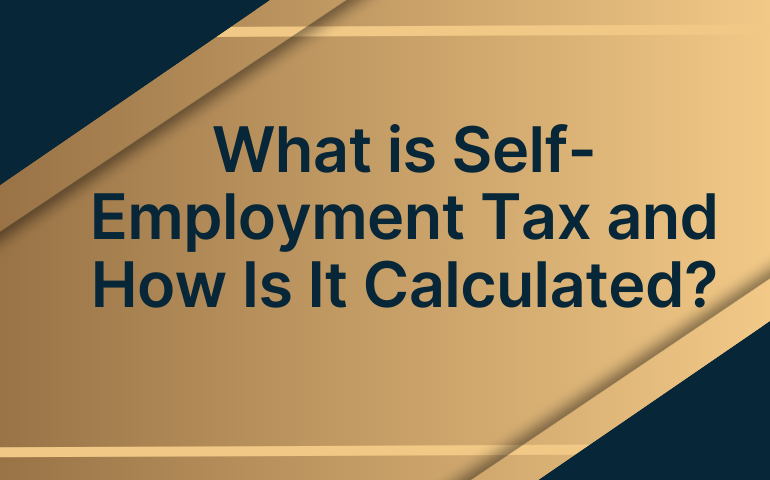
Mortgage Dove
What is Self-Employment Tax and How Is It Calculated?
As you navigate this entrepreneurial path, it's crucial to understand the financial responsibilities that come with it. One significant aspect is the self-employment tax, a topic that often raises questions and uncertainties among freelancers, gig workers, and small business owners. Self-employment tax is the financial obligation that self-employed individuals bear, encompassing both the employee and employer contributions to Social Security and Medicare. In 2023, self-employment taxes will be 15.3% of net earnings. Net earnings are taxed at 12.4% for Social Security (also known as OASDI) and 2.9% for Medicare. There is a difference between self-employment tax and income tax. Social Security taxes apply to the first $160,200 of earnings for the 2023 tax year. The amount has increased from $147,000 in 2022. Self-employment net earnings over $200,000 for single filers and $250,000 for joint filers are subject to an additional Medicare tax of 0.9%. Social Security will take its share of earnings up to $168,600 in 2024 (up from $160,200 in 2023). In 2024, self-employment tax rates will remain at 15.3%. Unlike traditional employment, where employers and employees share the burden, self-employed individuals are responsible for both portions. This tax applies to net earnings, making it imperative for those earning $400 or more in a calendar year to comply with IRS regulations. Self-employment tax is not exclusive to a specific type of worker. Whether you're a gig worker, freelancer, sole proprietor, or a small business owner with specific business entities, if you earn $400 or more in net earnings per calendar year, you are obligated to pay self-employment tax. This financial responsibility applies to individuals regardless of age or their enrollment in Social Security or Medicare benefits. Understanding who falls under the self-employment tax bracket is crucial for all individuals venturing into the realm of self-employment. Using the following steps, you can determine how much self-employment taxes you will have to pay. These steps, while seemingly straightforward, require attention to detail. Utilizing IRS Schedule C to report business earnings and IRS Schedule SE to calculate self-employment taxes ensures accurate compliance with tax regulations. For those with uncertainties or complex financial situations, seeking advice from professionals like Mortgage Dove can provide invaluable support. Filing and paying self-employment tax necessitate essential documentation and adherence to specific forms. A Social Security number (SSN) or employer identification number (EIN) is mandatory, along with 1099-NEC or 1099-MISC forms, records of self-employment income, and relevant paperwork. Essential forms include IRS Schedule C to report business earnings, IRS Schedule SE to calculate self-employment taxes, and IRS 1040 to file income taxes. Making quarterly estimated tax payments becomes crucial for those expecting to owe $1,000 or more in taxes for the year. Staying proactive and informed is key to avoiding penalties and maintaining financial stability. The self-employment tax you pay can be deducted from your income taxes in half. If, for instance, your Schedule SE says you owe $2,000 in self-employment taxes, you'll be required to pay that amount when it's due during the year, but $1,000 will be deductible at tax time. It's also possible to maximize your tax deductions by working for yourself. Self-employed individuals are entitled to the qualified business income deduction, which allows them to deduct up to 20% of their net income. Moreover, you can deduct home office expenses, health insurance, and other expenses. Being self-employed brings the advantage of claiming various deductions, significantly reducing tax liability. Mortgage Dove recommends considering the following tax tips: If you're still learning about self-employment taxes, take a look at the following frequently asked questions. How much of my self-employed income is taxable? You are required to pay 15.3% of your self-employed income in self-employment taxes. Do I need to pay self-employment tax if I have a W-2? Individuals with only full-time employment and a W-2 are exempt from self-employment taxes unless they have additional self-employment income exceeding $400 in a calendar year. Can I write off self-employment tax? Yes, you may deduct 50% of the amount paid in self-employment taxes on your income tax return. How do I pay Social Security and Medicare taxes if I’m self-employed? As a self-employed individual, you are responsible for both Social Security and Medicare taxes, as you are considered your employer. Necessary tax forms can be obtained from IRS.gov. What deductions are available for self-employed individuals? Common deductions include the home office deduction, health insurance deduction, and retirement deduction, each offering substantial opportunities for reducing tax liability. Navigating the realm of self-employment tax requires a thorough understanding of obligations, calculations, and opportunities for deductions. Seeking guidance from professionals like Mortgage Dove can significantly enhance financial management, ensuring compliance with regulations and optimal tax planning. As you embark on your self-employment journey, empower yourself with knowledge and proactive financial strategies to thrive in the dynamic world of entrepreneurship.What Is Self-Employment Tax?
2023 self-employment tax rate
2024 self-employment tax rate
Who Pays Self-Employment Tax?
How to Calculate Self-Employment Tax
How To Pay Self-Employment Tax
Self-Employment Tax Deductions
Tax Tips For Self-Employed Filers
Self-Employment Tax FAQs
Bottom Line
"Mortgage Dove makes home financing convenient for every American. You can count on us to provide a home buying experience tailored to your personal needs and financial situation. We strive to give you the peace of mind that your home financing goals can be achieved.”

Mortgage®
www.mortgagedove.com



-and-how-does-it-work.png)